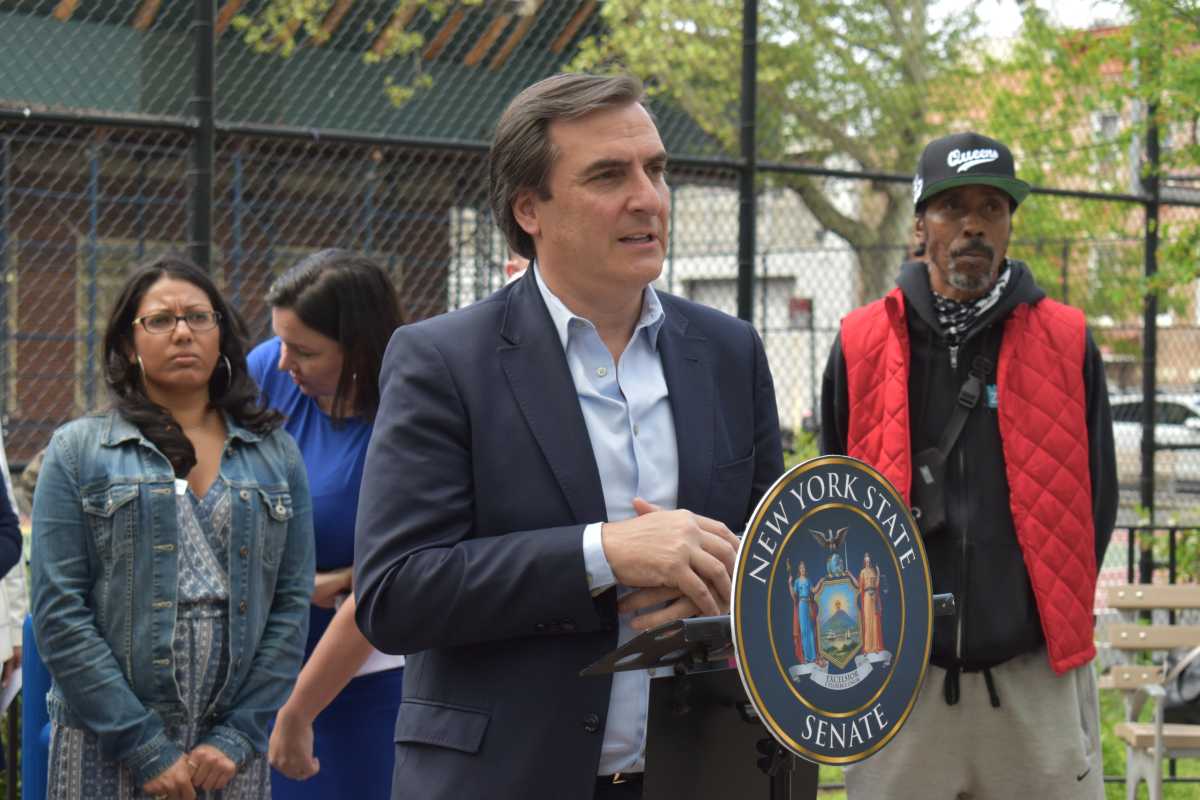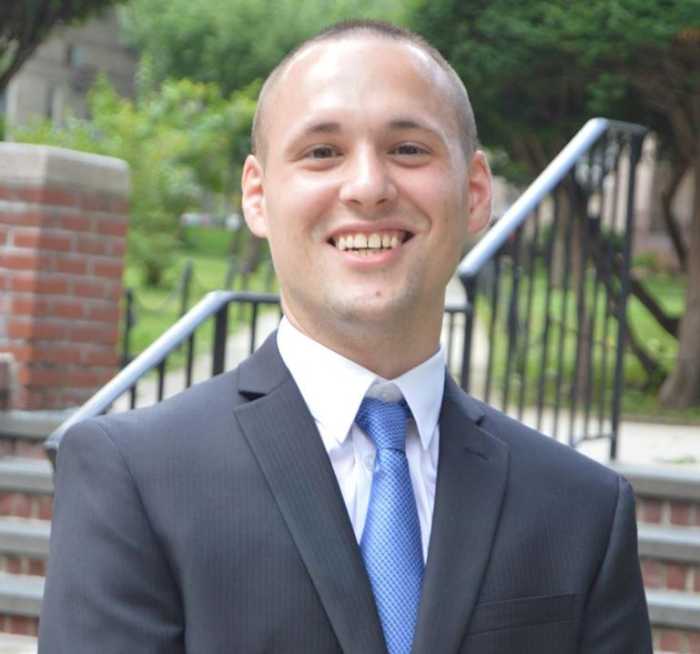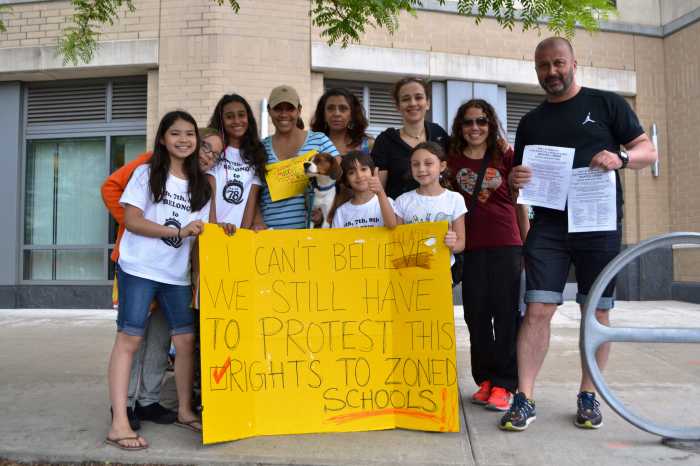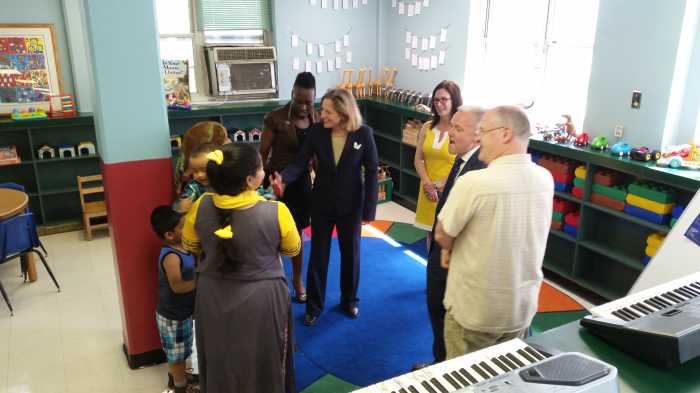District 30 parents, community leaders and legislators are furious this week at city Department of Education (DOE) Chancellor David Banks for ousting a beloved Queens superintendent with no explanation, they claim.
Dr. Philip Composto has been asked to step down after devoting his career to the schools in western Queens’ District 30 for over 40 years; his last day would be June 30. After learning of the news Wednesday, May 11, the community wasted no time protesting through petitions, online forums and rallies to call on the DOE to reverse its decision.
Last night, an impromptu meeting, organized by some District 30 Community Education Council (CEC) members, drew nearly 500 participants singing their praise of Composto’s work.
Principal Helen Ponella of I.S. 227 Louis Armstrong Middle School said that a new superintendent would simply not be able to know or understand their district like Composto does.
“We were the epicenter of the pandemic. How could anybody be able to come in and know our story and our journey and continue that healing with us and lead us in the way we need to be led?” Ponella said. “Our school has become one of the top 10 schools in academics because of his leadership.”
State and local elected officials came together Friday afternoon to call on the DOE to retain Composto as superintendent. The electeds have all said they reached out to the DOE with little response back and no explanation as to why Composto was asked to step down.
State Senate Deputy Leader Michael Gianaris pointed out that this issue proves the mayor should not have extended control over New York City schools.
Mayoral control is a policy that gives the city’s mayor almost total authority over its public schools. The mayor gets to choose both the school’s chancellor and nine members of the 15-member oversight board known as the Panel for Education Policy (PEP). With only a couple of weeks left in this year’s legislative session, it’s up to Gianaris and other state lawmakers whether to give the mayor continued authority over the city’s public school system.
“In the next two weeks, the city is going to try and make a case that they should be allowed to continue their current control of the city school system,” Gianaris said. “And one of the big debates is should the communities have more say in the decisions that are made. And yet the city is making the best argument against itself by doing what it’s doing.”
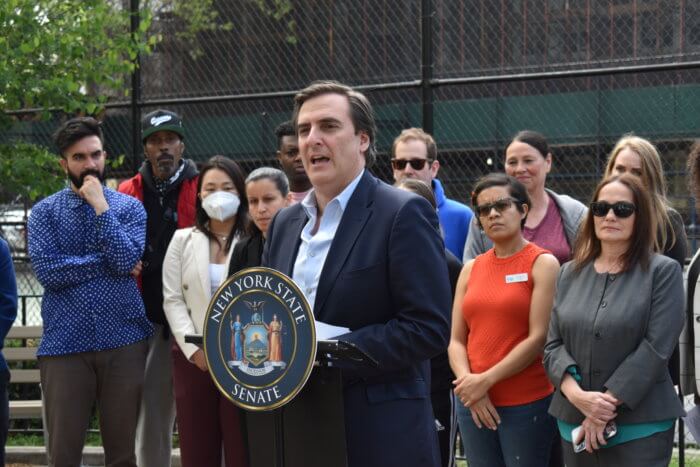
Assemblyman Zohran Mamdani echoed Gianaris, saying the city needs a mayor that understands the value of community input.
“We need a mayor and a chancellor that live up to their word when they say that there will be community input,” Mamdani said. “What this process and the manner in which it was delivered has shown us that those of us who have concerns about mayoral control were right.”
All state legislators who attended the rally — Gianaris, Mamdani and Assemblywoman Cathy Nolan — said that as it stands, they would not vote to allow Adams extended mayoral control.
Gianaris revealed that through his short conversations with the DOE, they said that “the chancellor does not share [Composto’s] vision.”
Nolan said that it’s a bad time to be a parent in the New York City school system when “the chancellor is not listening to the voices of the parents.”
“Mayoral control is not meant to exclude the voices of parents,” Nolan said. “Composto is an authentically engaged superintendent and I would urge the mayor and the chancellor to rethink this ill-advised decision. Mayoral control is not imperial control.”
Deborah Alexander, a member of the District 30 CEC for 10 years, was fraught with emotion while speaking about her close colleague.
“Composto lives and breathes this district,” Alexander said. “For the CEC members, he gives us our own children’s book he hand selected, which he inscribes with a personal message about his experience with us or a wish for us.
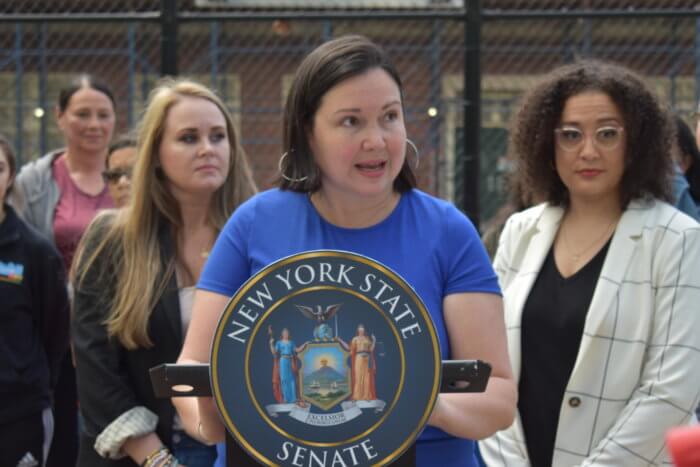
“Being a nice guy is not grounds to keep someone in their job. He should have his job because he is an educator, a lifelong learner. He listens. He respects the opinion of the community. He’s just a model.”
Alexander said that during her conversations with Composto, he used the word “heartbroken” to describe his feelings at this time.
“This is a very stoic man; I know he felt absolutely humiliated and gut-punched,” Alexander said. “This was really out of left field for him — just shocking.”
Many are confused as to why the DOE would make this decision, especially without community input. When a new chancellor is appointed, superintendents are often reinterviewed through regulatory processes like the C-37, Alexander explained. However, this was not the case for Composto. According to Alexander and others, Composto was not even given the option to move forward in the interview process.
“They excluded Composto from that next step of going to town halls and the C-37 interview — immediately removing him without any sort of consultation with the community at all,” Alexander said.
In response to a reporter’s question about the firing at an unrelated press conference Friday morning, Mayor Eric Adams defended his hand-picked schools chancellor. Adams said he’s a “big fan” of Banks and he fully supports the staffing system Banks put in place.
“He is reforming a school system that has been dysfunctional and that has been broken for so long,” Adams said. “And one of the things he must do is he must put in place his generals that are going to be in charge of school districts to support principals, like the principals here in this district.
“He has put in place a system that will do it in tiers, that is going to have involvement from parents and communities and allow the superintendents to go in front of the communities to interview for a position. He’s taking the best two applicants, and he’s allowing now the community stakeholders to sit down and interview them.”
Although many parents have said they were blindsided by Banks’ decision and weren’t involved enough in the process, Adams said he thinks Banks has made seeking parents’ input a top priority in the selection process.
“I’m blown away at how many CECs he attends,” Adams said. “How many times he speaks with parents. How he looks at numbers of the districts, how well are they doing. How he gets the best product in front of the parents. Now, let’s be clear, the number of students in that district is a large number. So, of the number of parents who say they were not involved, how many are saying they are going to be involved and will be involved in this next leg of the process.”
The DOE could not be reached for comment before QNS’ deadline.

